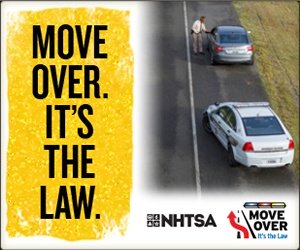Learn these facts about the “Move Over” law so you can do your part to protect those who protect you. It’s not just the law—it’s the right thing to do.
I’ve never heard of the “Move Over” law – what is it?
Laws vary from State to State, but in general: When an emergency vehicle using any visual signal is stopped or parked on or next to a roadway, drivers approaching the emergency vehicle should (1) make a lane change into an available lane not immediately adjacent to the emergency vehicle; or (2) if unable to safely make a lane change, slow down to a reasonable speed for existing weather, road, and vehicular or pedestrian traffic conditions.
How do I know if my State has a “Move Over” law?
All 50 States have enacted “Move Over” laws, but very few Americans know they exist. Visit https://exchange.aaa.com to find out your State’s law.
If I violate the “Move Over” law, what is the penalty?
Fines for violations of the “Move Over” law vary from State to State. In some States, violation of the law is punishable by jail time as well.
Is it really that unsafe to drive next to a law enforcement officer stopped on the side of a highway?
Yes. Making a traffic stop, investigating a crash or assisting a motorist are some of the most dangerous things law enforcement officers do. In 2017 alone, 47 law enforcement officers were killed in traffic-related incidents.
Why am I hearing so much about this law now? Is it new?
No. In fact, the first “Move Over” law originated in South Carolina in 1996 after a paramedic was struck and killed while responding to a crash. Since then, every State has enacted such laws, including Hawaii, which in 2012 became the 50th and final State to enact “Move Over” legislation. Unfortunately, not everyone is familiar with these laws, so the U.S. Department of Transportation’s National Highway Traffic Safety Administration is spreading the word.
Source: National Highway Traffic Safety Administration
This material is intended to be a broad overview of the subject matter and is provided for informational purposes only. Joe Morten & Son, Inc. does not provide legal advice to its insureds or other parties, nor does it advise insureds or other parties on employment-related issues, therefore the subject matter is not intended to serve as legal or employment advice for any issue(s) that may arise in the operations of its insureds or other parties. Legal advice should always be sought from legal counsel. Joe Morten & Son, Inc. shall have neither liability nor responsibility to any person or entity with respect to any loss, action, or inaction alleged to be caused directly or indirectly as a result of the information contained herein. Reprinted with permission from Great West Casualty Company.


